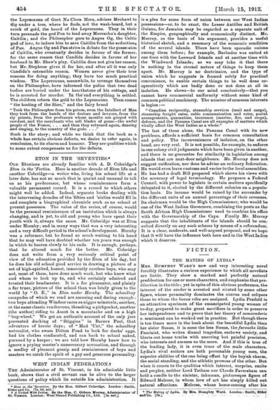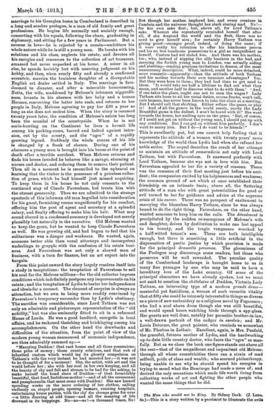FICTION.
THE MATING OF LYDIA.*
MRS. HIIMPHRY WARD'S new and very interesting novel forcibly illustrates a curious experience to which all novelists are liable. They show a marked and perfectly natural predilection for one or more characters, and emphasize that pre-- dilection in the title; yet in spite of this obvious preference, the interest -of the reader is arrested and riveted by some other figure, whose personality dominates the canvas and eclipses those to whom the beaux roles are assigned. Lydia Penfold is an attractive Specimen of 'the- emancipated young -woman of to-day, prepared. to make great sacrifices in order to preserve her independence and to prove that her theory of camaraderie v. sentiment can be worked out in practice. But though there is ten times more in the book about the beautiful Lydia than her sister Susan, it is none the less Susan, the faroucke-little Feminist, who writes dismal tragedies, eschews society, and blurts out home truths with unerring but painful precision, who interests and amuses us the more. And if this is true of the leading lady, it is even truer of the male characters. Lydia's rival suitors are both personable young men, the superior abilities of the one being offset by the boyish charm, the social standing, and the athletic prowess of the other. But when it comes to the qualities which interest, surprise, excite and perplex, neither Lord Tatham nor Claude Faversham can hold a-candle to the sinister, inhuman, picturesque .figure of Edward Melrose, in whom love of art has simply -killed out . natural affections. . Melrose, whose home-coming after his
marriage to his Georgian home,* Cumberland is described- in, a long and sombre prologue, is a man of old family and great professions. He begins life normally and sociably. enough, consorting with his equals, following the chase, graduating in diplomacy, and sitting for a few years in Parliament. But a ioverse in love—be is rejected- by a cousin—embitters his whole nature while be is still a young man. He breaks with his relations and his class, neglects his estate, and devotes all his energies and resources to the collection of art- treasures, amassed but never unpacked at his home. A miser in all else, he spends lavishly but with unerring judgment on his hobby, and then, when nearly fifty and already a confirmed eccentric, marries the brainless daughter of a disreputable English art dealer settled in Italy. The marriage is fore- doomed to disaster, and after a miserable homecoming,
Netta, the wife, maddened by Melrose's inhuman niggardli- ness, levants in his absence with her baby and a bronze
Hermes, converting the latter into cash, and returns to her people in Italy, Melrose agreeing to pay. her £80 a year so long as she does not molest him. When the story is resumed twenty years later, the condition of Melrose's estate has long been the scandal of the countryside. When he is not curio-hunting on the Continent he lives a hermit life among his packing-cases, barred and bolted against intru- sion, cut by the county, and the "ogre" of a rapidly growing legend. Suddenly the whole course of his • life
is changed by a freak of chance. During one of his absences a young man is brought into his house at the point of
death after a terrible accident. When Melrose returns and finds his house invaded he behaves like a savage, storming at nurses and doctor, and ordering them to remove their patient. Then all in a moment he is reconciled to the upheaval on learning that the visitor is the possessor of a priceless collec- tion of gems, which he had himself just missed acquiring. To keep them in his house he not cnly consents to the continued stay of. Claude Faversham, but treats him with the utmost generosity. Thus we are admitted to the strange spectacle of this inhuman old man beguiled into consideration for his guest, furnishing rooms magnificently for his comfort, offering him • the post of agent and secretary at a splendid salary, and finally offering to make him his heir. What may sound absurd in a condensed summary is developed not merely plausibly but naturally in tke narrative. Old Melrose wanted to keep the gems, but he wanted to keep Claude Faversham as well. He was growing old, and had begun to feel that his solitariness was a danger and weakness. He wanted, again, someone better able than venal attorneys and incompetent ihnderlings to grapple with the confusion of his estate busi-
ness. And Faversham was not only a shrewd man of business, with a turn for finance, but an art expert into the
bargain.
_From this point onward the story largely resolves itself into
a study in temptations: the temptation of Faversham to sell his soul for the Melrose millions—for the old collector imposes conditions which indefinitely postpone any improvements on his estate ; and the temptation of Lydia to barter her independence and ideals for a coronet. The element of surprise is always an attraction, but -we own to being more readily convinced by Faversham's temporary surrender than by Lydia's obstinacy. The sacrifice was considerable, since Lord Tatham was not only an admirable and picturesque representation of the " old nobility," but was also eminently fitted to sit in a reformed House of Lords. He was a good landlord, energetic in local affairs, and he reckoned thatching and bricklaying among his accomplishments. On the other hand the drawbacks and difficulties of the situation, from the point of view of the modern young woman enamoured of economic independence,
are thus admirably summed up :—
"Marrying Duddon ! that vast house and all those possessions; those piles of money ; those- county relations, and that web of inherited custom which would lay its ghostly compulsion on Tatham's. wife the very instant he had married her ;—it was not to be thought of for a moment! She, the artist, with art and the world before her ; she with her soul in her own keeping, and all the beauty of sky and fell and stream to be had for the asking, to make herself the bond slave of Duddon—of that formidably beautiful, that fond, fastidious mother !—and of all the ceremonial and paraphernalia.that must come with.Duddon.! She saw herself spending weeks on the mere ordering of her clothes, calling endlessly on stupid people; opening bazaars, running hospitals, entertaining house parties, with the clef des champs gone for ever —a little drawing at odd times—and all the meaning of life &Owned in its- trappings. No-:--no—no !—a thousand times, No ! Not though. her mother_ implored her, and every creature in Cumbria and. the universe thought berstark staring mad. No !— for her OW i sake. first; but, above all, for Lord Tatham's sake. Whereat she repentantly reminded herself that after all, if she despised the world and the flesh, there was no need to give herself sirs ; for certainly Harry Tatham was giving proof—stronger proof, indeed, of doinc• the same; if it were really his intention to offer his handsome person and his no leas handsome possessions to a. girl as insignificant as herself. Custom had not staled him. And there was his mother. too ; who, instead of nipping the silly business in the bud, and carrying the foolish young man to London, was actually aiding and abetting—sending gracious- invitations to dinner, of the most unnecessary description. What, indeed, could be more detached,. more romantic—apparentlythan the attitude of both Tatham and his mother towards. their own immense advantages ? Yes.. But they were born to them ; they had had time to get used to them. • It would take me half a lifetime to find out what they mean, and another half to discover what to do with them.' • And, if one takes the place, ought one not to earn the wages ? Lady Tatham sits loose to all her social duties, scorns frocks, won't call, cuts bazaars, has never been known to take the chair at a meeting. But I should call that shirking. Either refuse the game, or play it ! And of all the games in the world surely, surely the Lady Bountiful game is the dullest. I won't be bored with it!' She went' towards the house, her smiling eyes on the grass. 'But, of course, if I could not get on without the young man, I should put up with any conditions. But I can get on without him perfectly. I don't want to marry him. But I do—I do want to be friends !"
This is excellently put, but one cannot help feeling that it represents the attitude of a woman with twenty years' more knowledge of the world than Lydia had when-she refused her
noble suitor. The sequel describes the result of her attempt to maintain an attitude of camaraderie not only with Lord
Tatham, but with Faversham. It answered perfectly with Lord Tatham, because she was not in love with him. But Faversham appealed to her for a variety of reasons. There was the romance of their first meeting just before his acci- dent; the compassion excited by his helplessness and weakness; the common ground of art which at once established their friendship on an intimate basis ; above all, the flattering
attitude of a man who with great potentialities for good or evil turned to her for guidance and advice at the supreme crisis of his career. There vas no prospect of excitement in marrying the blameless Harry Tatham, since he was always bound to do the right thing. Faversham, on the other band, wanted someone to keep him on the rails. The &filament is precipitated by the sudden re-emergence of Melrose's wife and daughter, driven , by destitution to make one last appeal to his bounty, and the 'tragic vengeance wreaked by a halt-witted tenant's son. These are both intelligible enough, but there is something a little artificial in the dispensation of poetic justice by which provision is made for the principal dramatis personae. The gloominess of the Prologue may discourage some readers, but those who persevere will be well rewarded. The peculiar, quality of the Cumberland landscape is brought home to us in
many fine passages by one who may be said to have a hereditary love of the Lake country. Of some of the
principal characters we have already spoken, but we must not omit to mention the_clatelaine of Duddon, Victoria Lady Tatham, an interesting type _of a modern grande dame—
masterful yet fastidious, a woman of such versatile vitality that at fifty she could be intensely interested in things so diverse as a piece of new embroidery or a religious novel by Fogazzaro ; who had a soul above dress though she was still beautiful, and would spend hours watching birds through a spy-glass.
Her guests are well done, notably her parasitic brother-in-law, a well-drawn portrait of the cadger is ezcelsis; and Mr. Louis Delorme, the great painter, who reminds us somewhat of Mr. Phoebus in Lothair. Excellent, again, is Mrs. Penfold, the graceful, fatuous mother of Lydia, and the hardworking up-to-date little country doctor, who faces the "ogre" so man- fully. But as we close the book one figure stands out above all the rest—that of the magnificent and impenitent old Melrose, through all whose eccentricities there ran a strain of mad
selfwill, pride of class and wealth ; who scorned philanthropy, being unable to see why he should spend his energies in
trying to mend what the Demiurge had made a mess of; and derived the only sensations which made life worth living from
collecting works of art and fighting the other people who wanted the same things that he did.















































 Previous page
Previous page